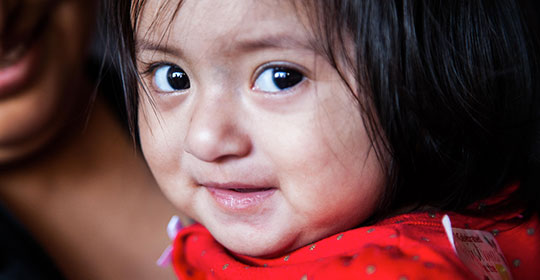
Reuniting Homeless Moms with their Children
“There are 450 beds at Los Angeles Mission, and behind each of those beds is a family,” says Los Angeles Mission CEO, Herb Smith. Indeed, when people become homeless, it affects more than just the individual. It has a grave impact on all their loved ones. For homeless moms, it’s especially felt by their children.
Up to 50% of the homeless population in Los Angeles are made up of women, and many of them are single moms. What so many of them want this holiday season is to be with their kids again. At this time, efforts for reunification are more important than ever.
Homeless, without their kids
While homeless families, typically headed by a single mother, account for up to 43% of the homeless in LA County, there are also mothers who have lost not only their homes, but the custody of their children as well.
Many women have dealt with domestic violence, substance abuse, and mental health issues that have left them unable to keep their kids. Arriving at Los Angeles Mission, many are fearful and overwhelmed, with a double challenge of getting their lives on track – and getting their children back.
The support homeless moms need
For these women, guidance and hope is critical. Homelessness in any situation is tragic, creating mental, physical, and emotional stress. But these women have the compounded issues of being away from their kids. Guilt, recovery, and legal issues all combine to make homelessness even more challenging. Adding the element of the holidays only makes it worse.
For these moms, being able to see their kids again is often all they want.
Impact on kids
The effect on kids can be just as harsh. Kids who themselves are homeless can experience negative consequences, including infectious diseases, poorer educational attainments, mental health problems, and overall health issues.
Another issue for homeless children is that they are at high risk of falling behind in school due to their mobility. With every move, children can lose three to six months of education. Without the ability to get a solid, consistent education, homeless children are less likely to acquire the skills they need to succeed as adults.
In addition, homeless moms also may worry that even if their children do have housing, their kids may still feel a sense of abandonment when they, as mothers, can’t be there for them. Symptoms of motherhood abandonment for children include low self-esteem, guilt, and feelings of being “unlovable.”
Bringing moms and kids back together
Because of these potential outcomes, Los Angeles Mission makes every effort to make reunification possible. Through the Anne Douglas Center for Women, homeless moms can go through a 12-month intensive rehabilitation program, in which they are provided shelter, meals, and clothing, and taught the skills to make changes in their lives. They are guided to break the cycle of self-destruction, and finally see themselves as women of value.
From there, women can go on to complete a 12-month transition program, designed to prepare them to re-enter society.
Most importantly, by completing both rehabilitation and transition programs, these women are eligible for support services that are critical to reconnecting with their children: Family reunification and liaison assistance for social and legal proceedings.
Smith says the Los Angeles Mission works to do whatever is appropriate and possible to bring these families back together.
Homelessness takes on many forms, affecting students, veterans, families, women, and moms. And during the holidays, implications of homelessness are especially significant. At Big Change Advisors, we continue to keep these individuals in our thoughts and in our hearts.

